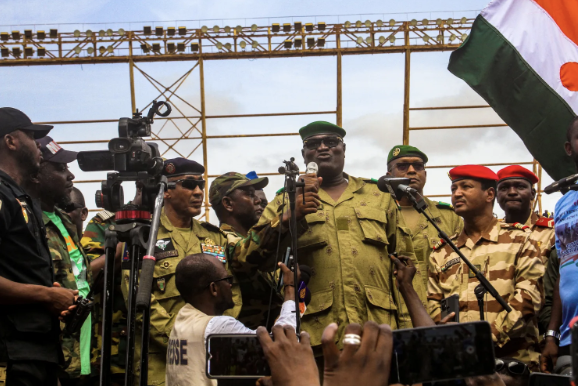![]()
On Sept. 27, Dr. Cindy Courvile, former United States Ambassador to the African Union, and Dr. Daniel Twining, President of the International Republican Institute, spoke to the Georgetown chapter of the Alexander Hamilton Society on an important event that has captivated the world’s attention for the past two months: the Coup d’etat in Niger.
On July 26, Niger’s democratically elected President Mohamed Bazoum was detained by a military junta. The military force suspended the Constitution and proclaimed General Abdourahamane Tiani, the coup leader, as the new head of state.
The military junta justified overthrowing the government due to the country’s deteriorating security, calling for national and international support of the new regime and non-intervention of foreign actors.
Despite the rising concern of neighboring countries and the West over the security and economic implications of the uprising on the Nigerien people and the world, some Nigerien people showed up in support of the military regime. Groups organized by the junta and civil societies marched on Aug. 3, Niger’s independence day, to chant for freedom from neo-colonialism and recent coups in neighboring countries. Some celebrated the friendship between Niger and Russia.
The situation in Niger and the Sahel region is chaotic. With six African countries in the area experiencing eight coups in three years, the Sahel region is now a breeding ground for mutiny and violence as instability and poverty mount.
Niger is one of the poorest countries in the world, with 41.8 percent of its population living in extreme poverty in 2021. The average life expectancy in Niger is 62.4, compared to the world average of 72 years. The high level of poverty and unemployment rate leave many young people with nothing to do or strive for. 82 percent of Nigeriens rely on agriculture to make a living. The few arable lands, droughts and regular forced relocation due to security concerns have caused many to be stuck in poverty. The country as a whole has very little infrastructure to support diversification of the economy and urban development.
In addition to the unaddressed basic needs, Niger faces constant security challenges as armed groups in neighboring Nigeria, Burkina Faso and Mali perpetrate attacks and violent crimes against security forces and civilians. Despite efforts by the U.S. and the EU to provide monetary and security assistance in the past decade, violent crime in the region only increased. Many of the armed groups are affiliated with Islamic extremists, often referred to as Jihads. The most active terrorist groups include the Greater Sahara (ISGS), ISIS-GS, Boko Haram, ISIS-WA and JNIM. In 2021 alone, terrorist organizations carried out at least 74 attacks in Niger.
Another key contributor to the current development is the French colonial legacy. In 1899, France expanded its control over western Africa through a brutal military campaign. Despite multiple rebellions and the eventual independence of Niger in 1960, France retained political and economic influence over the country by providing military assistance and monopolizing the mining industry. The explosive colonial regime left a poorly diversified economy that precipitated continuous exploitation by foreign corporations. France held colonial control over West Africa through military occupation from 1899, and even after Niger declared independence in 1960, France continued to exert political and economic influence through military assistance and monopolization of the mining industry.
Niger provides 5 percent of the world’s uranium mining output.France is the sole recipient of all Niger’s uranium exports as of 2019. In 2022, France relied on Niger for 20.2 percent of its uranium imports. A great trade relationship with one of the major European powers would be economically beneficial if the relationship were equal. However, Niger is a victim of the natural resource curse, which is a situation where abundant natural resources are exploited by a few rather than boosting the overall economy. With control over the Nigerien uranium, France has been the biggest beneficiary of the curse at the expense of the economic wellbeing of the average Nigerien.
In the case of Niger, French state-owned mining company Areva has exploited Niger’s reliance on uranium exports to France to sign unequal contracts. For instance, for a decade, Areva pays 5.5 percent of royalties in Niger as opposed to the 13 percent Areva pays in Canada and the 18.5 percent paid in Kazakhstan. As a result of the extractive contracts and business practices that benefit foreigners rather than the average Nigeriens, who makes an average of $614 in 2023.
Further fueling the public’s anti-France sentiments is the unsuccessful military operation led by France against jihad groups in the region. According to the Council on Foreign Relations, in 2017, France, Burkina Faso, Chad, Mali, Mauritania and Niger created the G5 Sahel Force, “a five-thousand-troop-strong counterterrorism force aimed at fighting militant groups with an expanded mandate to cross borders in the Sahel region.” Since then France has deployed 5,100 troops, in collaboration with 15,000 UN peacekeepers around the world and 1,500 U.S. troops in the Sahel to combat groups across West and North Africa. Rather than stabilize the region, these international effort has led to the “spread of militancy to countries across the Sahel.” The failure of these French-led military campaigns further fueled anti-French sentiments.
Weak government and democratic institutions contribute to these entrenched issues. Despite putting in office a popularly elected president, the majority of Nigerien people feel that they are not heard and represented in government policies and priorities, and 90 percent of people feel that the policies do not help them. The United States Institute of Peace has found that the “average Nigeriens are most concerned about inter-communal conflict, land tenure, and banditry (including but not limited to cattle theft), and violent crime.” However, the government has been mostly concerned with combating extremist groups. There has been no strategic plan to reinforce existing institutions and address public needs. Public discontent has simmered for a long time, and the desire for change has peaked.
Seeing the growing discontent due to ineffective governance and the absence of security, the military junta exploited the power vacuum to claim legitimacy over the country. Despite promises of greater security and stability by the junta, not many are optimistic about the future. Most observers anticipate greater instability and suffering in the region as demonstrated by the aftermath of a military coup in Mali. Not only did jihadist activities increase but the country underwent another coup in 2021, resulting in Mali’s current interim government under a military junta. Military force alone does not provide the security and prosperity Niger needs. The country requires better governance and strengthened institutions to solve systematic challenges.
One might wonder why the U.S. would be concerned with the state of a distant African country that it has minimal economic ties with. The answer is threefold: to constrain the expanding influence of Russia and China, to counter terrorist activities in the region and to ease the migration crisis in the Western hemisphere.
Niger has helped the West in combating terrorism in West Africa. A long-term ally that hosts two key U.S. drone and counter-terror bases, allowing the U.S. to carry out important operations including wide-ranging patrols by armed drones. Losing these posts would be a considerable setback for counterterrorism efforts in the region.
The Russian Wagner Group is taking advantage of the turmoil in Niger. Facing economic sanctions from the United States and EU sanctions because of the war in Ukraine, Russia is trying to get some quick cash by infiltrating West Africa through the Wagner militia, according to Dr. Courvile. Immediately after President Bazoum was ousted, Wagner leaders signaled their intent to provide “assistance.” The militia leader also reached out to Wagner members in Mali for military support. Halting U.S support for democratic transformation and maintenance in the region allows Russia to exploit the power vacuum and expand their sphere of influence.
Meanwhile, China has been investing in Africa and increasing its control over some media outlets, which have promulgated propaganda that intends to improve African perceptions of China and the Communist Party of China while harming the U.S. image. As Russia and China get increasingly involved in the region, the West should be alarmed by the long-term security implications to individual nations and the global liberal order.
Finally, the majority of migrants traveling from sub-Saharan Africa to northern coastal states and on to Europe go through the Sahel region. An explosion of migrants and refugees driven out by rising violence and poverty can further burden the coastal African states and European countries, creating a political problem for Western leaders.
The instability in Niger and the precarious conditions in the entire Sahel region cannot be solved easily. However, the West should consider several crucial factors when intervening for more effective results. First, ensuring stability in the region requires investment in building necessary infrastructure and a diversified economy in addition to security. This means investing in projects other than military forces is crucial.
Second, democratic backsliding in the region is a decade-long phenomenon that requires a generational change that can only be achieved through consistent work of grassroots NGOs and nonprofits with state support to strengthen civil societies and inform the citizenry. One way to do so is to reinforce programs such as Voice of America to inform the Nigerien public and broaden their views of alternative options.
Third, respecting and incorporating local stakeholders dealing with a challenge of such a scale, in a complex historical background and against the backdrop of diverse ethnic and cultural groups in the region makes communication with local authorities and incorporation of local views imperative.
One way to approach this issue more holistically is to collaborate with local agencies, such as the Economic Community of West African States (ECOWAS). By evaluating the best course of action with these on-the-ground inputs and accurate knowledge, the West can start tailoring its strategies to account for local interests and values. In practice, this would look like dialogues where leaders agree to disagree, give credit and weight to African leadership and provide expertise and resources needed with fewer strings attached.
Due to the strong anti-French sentiments, further collaboration with France to stabilize the Sahel region might backfire. Locals are alarmed by French interference in internal policy making and economic stagnation partially caused by colonial currency CFA franc. Therefore, the United States must distance itself from France when offering assistance and take initiative rather than deferring to France on this key matter.
In order to reverse the democratic backsliding and stabilize the Sahel, the West must recognize its prior failure in providing adequate support for civilians and infrastructure-building and rethink its strategy to provide long-term security and economic prosperity for the region.










